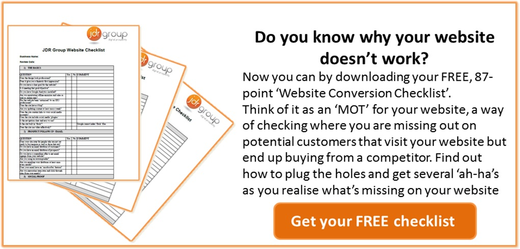10 Steps To An Effective Website That Attracts Enquiries & Sales

This guide will give you all that you need to know in order to create a website that brings in enquiries and sales, or to improve on what you’re currently doing in the online world of opportunity!
1. Know your Target Market
It sounds simple, yet so few people take advantage of this. Think about who your ideal customers are, who buy the most from you, who are the people that buy from you for the least amount of effort? In other words, think about the type of customers you want, and build your website to target them. Your website’s purpose is to entice the customers that you want! By taking the time to think about your target market and taking the time to incorporate these thoughts into your website, you are already one step ahead of the game.
2. Why will people visit my website?
Why will somebody be looking for what you do? Also consider, when would they do this? These are the questions you need to ask when creating an effective website, because once you know the answer, you can cater for those particular reasons, and make your website stand out from the crowd. If you relate your content and design to your ideal customers, they will instantly feel more attached to you as a business. They will stay on your site longer as they will relate to the content, and be less likely to move on to one of your competitors.
3. Why should they use YOU?
This is probably one of the most important elements left out of most business websites. What makes you different to your competitors? Let’s be honest, when we’re looking for something today, we don’t just look in one shop or go to one website. Your customers won’t either! Whether you like it or not, they will be looking at your competitors’ websites too, so if you can give them some great benefits of what makes you different to the rest, you will be the front runner.
4. Can you prove it?
It’s all well and good saying you’re the best, but you must back it up. Saying you’re the best company in the world is fine, but if you’re not, you will lose trust and credibility throughout the rest of your website. Use tools like testimonials, and statistics proving your product/service is better. Endorsements from well-known companies or individuals are also a great way to help you get the edge over your competitors. List your accreditations, awards and anything else that shows you as an expert in what you do. Case studies of previous jobs work well too. People believe what other people say about you more than what you have to say about yourself.
5. Why should they contact you?
If you want people to contact you via telephone, give them a benefit to do so! The Internet is fiercely cut throat, and you have to be more direct online, so you have to give your customers instructions and benefits to why they should get in touch. If you hide your phone number on some internal page, and make it hard for people to get in touch, you are giving people the impression that you don’t want them to call you.
6. Start Collating A Database
There will have been many occasions that you have thought about getting a product or a service, maybe done some research online but then lost interest and never acted on it. This happens all the time. There will have been potential customers that have at one point, been on your website, and for one reason or another, not bought from you. Don’t let them get away so easily! Having an offer on your site in exchange for a name and email address will help you on your way to creating a database of potentially interested people, who you can keep in touch with. When those customers are in buying mode again, you will be the first business they go to, as your name will be fresh in their minds.
7. Keep it simple!
You could have the best website in the world, but if nobody can find what they’re looking for, it’s a complete waste of time. Fancy graphics can give your website the wow factor, but it’s the reasons above that they will buy. What your website should aim to do is help your potential customers to trust you enough to call you or buy from you. It really is that simple.
8. Keep it up to date
Regularly updated websites not only help your rankings on Google, they build trust and credibility with your customers. If people see that your website hasn’t been touched for a few years, it is going to make them question. Are you still open? Are you up to speed with the latest technology? Do you care about your image? So many things will go through their mind that they will undoubtedly disregard any content on your site.
9. Ensure your website is found in the search engines
Arguably the most vital part to online marketing. You can do all of the steps above to make sure your website is the ‘bees knees’, but if nobody goes on it, there isn’t really a lot of point in having one at all. 85% of all web traffic originates from Google, so if you’re going to do any type of marketing online, it makes sense to start there.
10. Keyword research
An essential part of any marketing campaign is research, and your website is no different. After all of the hard work you’ve put in getting your website right, promoting it on Google, and getting new potential customers to your site, you need to make sure you are attracting the right people. If they are not going to be interested in what you do, then it will be a costly exercise with little return. If you research what your target market will search for, when they would do it, what they would type in, whether terminology changes in time, you can drive relevant traffic to your website. Traffic, which will have you generating enquiry after enquiry, and sale, read 'How to choose the right keywords for SEO':
Article by Andy Gibbins
photo credit: alles-schlumpf via photopin cc

